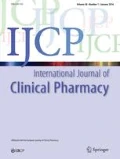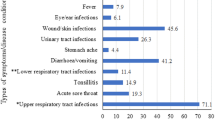Abstract
Background Overuse of antibiotics is a global concern and the World Health Organisation (WHO) has warned of relapsing to an era with no effective antibiotics. In Australia, various national consumer campaigns had been running since 2000, and the concern was prioritised in 2011, when the need for a national approach to address antibiotic resistance was identified. Objective The aim of this study was to explore consumer attitudes and knowledge about (upper respiratory tract) infections, colds and flu, and antibiotics, and to identify factors contributing to antibiotic misuse which could be addressed by tailored patient counselling. Setting A community pharmacy in an area of Brisbane, Australia. Method A self-administered anonymous questionnaire was distributed among pharmacy consumers. Perceptions of, and knowledge about antibiotics were measured using a 5-point Likert-type scale of agreement/disagreement. Main outcome measure The proportion of self-diagnosers and non self-diagnosers who agreed/disagreed with the attitude statement, “I know that I need antibiotics before I visit my doctor”; and the proportion of mistaken and non-mistaken who agreed/disagreed with the statement, “I will get better faster if I take antibiotics when I have a cold or flu”. Results Over a third of the 252 participants believed that they would recover faster by taking antibiotics when suffering from a cold or flu, and nearly one-fifth felt that antibiotics would cure viral infections. More females (62.2 vs. 43.9 %) self-diagnosed (p = 0.002) although more males (42.1 vs. 30.8 %) were mistaken about the efficacy of antibiotics for treating colds and flus. Mistaken respondents were more likely than non-mistaken respondents to self-diagnose (p = 0.01). Conclusion This study confirms a lack of knowledge among consumers about the efficacy of antibiotics in treating viral infections despite education campaigns. The findings strongly suggest there is a need for pharmacists and other health care professionals to elicit consumer beliefs and understanding about antibiotics and to tailor their advice appropriately.

Similar content being viewed by others
References
NPS Medicinewise. Antimicrobial stewardship: what’s it all about? Aust. Prescr. 2013;36(4):116–20.
NPS Medicinewise. Join the urgent fight against antibiotic resistance [Internet]. 2013 [updated 10 Jul 2013; cited 21 Feb 2015]. Available from: http://www.nps.org.au/media-centre/media-releases/repository/Join-the-urgent-fight-against-antibiotic-resistance.
Australian Bureau of Statistics. Australian Demographic Statistics, 2014 [Internet]. 2015 [updated 25 Jun 2015; cited 17 Sep 2015]. http://www.abs.gov.au/ausstats/abs@.nsf/mf/3101.0.
Davies J, Davies D. Origins and evolution of antibiotic resistance. Microbiol Mol Biol R. 2010;74(3):417–33.
World Health Organization. World Health Day 2011—Urgent action necessary to safeguard drug treatments [Internet]. 2011 [cited 5 Feb 2015]. Available from: http://www.who.int/mediacentre/news/releases/2011/whd_20110406/en/index.html.
Australian Health Ministers Advisory Council. Standing Council on Health Communique [Internet]. 2011 [cited 21 Feb 2015]. Available from: http://www.coaghealthcouncil.gov.au/Publications/Communiques/ArtMID/522/ArticleID/28.
Australian Government—Department of Health and Ageing. Antimicrobial resistance (AMR). Canberra, Australia [updated 1 June 2015; cited 15 July 2015]; Available from: http://www.health.gov.au/internet/main/publishing.nsf/Content/ohp-amr.htm.
Coenen S, Michiels B, Renard D, Denekens J, Van Royen P. Antibiotic prescribing for acute cough: the effect of perceived patient demand. Brit J Gen Pract. 2006;56(524):183–90.
Dallas A, Magin P, Morgan S, Tapley A, Henderson K, Ball J, et al. Antibiotic prescribing for respiratory infections: a cross-sectional analysis of the ReCEnT study exploring the habits of early-career doctors in primary care. Fam Pract. 2015;32(1):49–55.
Antibiotic Expert Groups. Therapeutic guidelines: antibiotic. Version 15. Melbourne: Therapeutic Guidelines Limited; 2014. ISBN: 9780980476477.
Wutzke SE, Artist MA, Kehoe LA, Fletcher M, Mackson JM, Weekes LM. Evaluation of a national programme to reduce inappropriate use of antibiotics for upper respiratory tract infections: effects on consumer awareness, beliefs, attitudes and behaviour in Australia. Health Promot Int. 2007;22(1):53–64.
Pan Y, Henderson J, Britt H. Antibiotic prescribing in Australian general practice: how has it changed from 1990–91 to 2002–03? Resp Med. 2006;100(11):2004–11.
NPS Medicinewise. 1 in 5 Australians expect antibiotics for coughs or colds: new NPS campaign [Internet]. 2012 [cited 21 Feb 2015]. Available from: http://www.nps.org.au/media-centre/media-releases/repository/1-in-5-australians-expect-antibiotics-for-coughs-or-colds-new-nps-campaign.
McNulty CAM, Boyle P, Nichols T, Clappison P, Davey P. The public’s attitudes to and compliance with antibiotics. J Antimicrob Chemoth. 2007;60(Suppl 1):i63–8.
Nutbeam D. Building health literacy in Australia. Med J Australia. 2009;191(10):525–6.
Adams RJ, Appleton SL, Hill CL, Dodd M, Findlay C, Wilson DH. Risks associated with low functional health literacy in an Australian population. Med J Australia. 2009;191(10):530–4.
Australian Bureau of Statistics. Australian Social Trends, 2009 [Internet]. 2009 [updated 30 Jun 2009; cited 17 Sep 2015]. http://www.abs.gov.au/AUSSTATS/abs@.nsf/Lookup/4102.0Main+Features20June+2009.
Hamm RM, Hicks RJ, Bemben DA. Antibiotics and respiratory infections: are patients more satisfied when expectations are met? J Fam Pract. 1996;43(1):56–62.
Altiner A, Knauf A, Moebes J, Sielk M, Wilm S. Acute cough: a qualitative analysis of how GPs manage the consultation when patients explicitly or implicitly expect antibiotic prescriptions. Fam Pract. 2004;21(5):500–6.
Vanden Eng J, Marcus R, Hadler JL, Imhoff B, Vugia DJ, Cieslak PR, et al. Consumer attitudes and use of antibiotics. Emerg Infect Dis. 2003;9(9):1128–35.
André M, Vernby Å, Berg J, Lundborg CS. A survey of public knowledge and awareness related to antibiotic use and resistance in Sweden. J Antimicrob Chemother. 2010;65(6):1292–6.
Donovan J. Australian Pharmaceutical Advisory Council. Consumer activities on antimicrobial resistance in Australia. Commun. Dis. Intell. 2003;27(Suppl):S42–6.
Arnold SR, Straus SE (2005) Interventions to improve antibiotic prescribing practices in ambulatory care. Cochrane Database Syst Rev. 2005(4).
Australian Government—Department of Health. Pharmaceutical Benefits Scheme (PBS) [Internet]. 2015 [cited 21 Feb 2015]. Available from: http://www.pbs.gov.au/pbs/home.
Thompson A, Copping S, Stafford A, Peterson G. Repeatable antibiotic prescriptions: an assessment of patient attitudes, knowledge and advice from health professionals. AMJ. 2014;7(1):1–5.
Zayegh I, Charrois TL, Hughes J, Hoti K. Antibiotic repeat prescriptions: are patients not re-filling them properly? J Pharm Policy Pract. 2014;7(1):17.
NPS Medicinewise. NPS News 15: When consumers expect antibiotics [Internet]. 2001 [updated Apr 2001; cited 21 Feb 2015]. Available from: http://www.nps.org.au/__data/assets/pdf_file/0007/15784/news15_urtis_antibiotics_0401.pdf.
Acknowledgments
The authors thank the consumers who participated in this study, and the management of the community pharmacy for permitting the study to be conducted.
Funding
The authors thank the Pharmaceutical Society of Australia for financial assistance for data entry; this had no influence on study design or data analysis.
Author information
Authors and Affiliations
Corresponding author
Ethics declarations
Conflicts of interest
None to declare.
Rights and permissions
About this article
Cite this article
Fredericks, I., Hollingworth, S., Pudmenzky, A. et al. Consumer knowledge and perceptions about antibiotics and upper respiratory tract infections in a community pharmacy. Int J Clin Pharm 37, 1213–1221 (2015). https://doi.org/10.1007/s11096-015-0188-y
Received:
Accepted:
Published:
Issue Date:
DOI: https://doi.org/10.1007/s11096-015-0188-y



